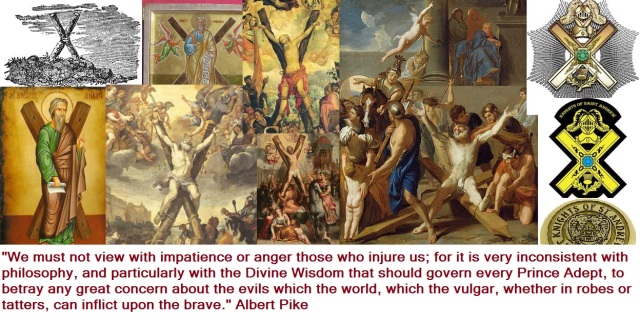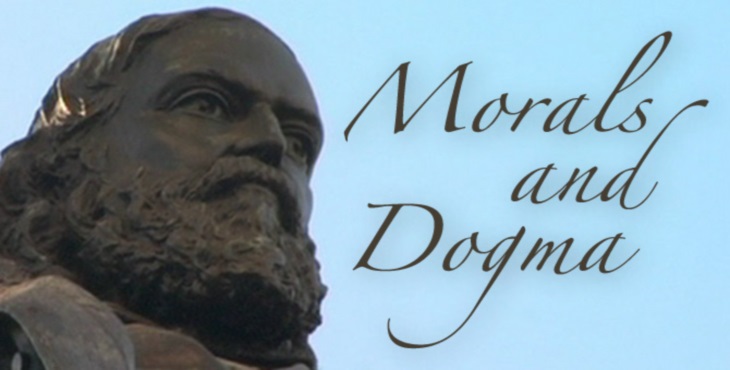
We now start on Chapter 29, in which Pike discusses the principles around the Ancient Cross of St. Andrews and its relationship to contemporary Freemasonry. I most enjoyed,
“We must not view with impatience or anger those who injure us; for it is very inconsistent with philosophy, and particularly with the Divine Wisdom that should govern every Prince Adept, to betray any great concern about the evils which the world, which the vulgar, whether in robes or tatters, can inflict upon the brave. The favor of God and the love of our Brethren rest upon a basis which the strength of malice cannot overthrow; and with these and a generous temper and noble equanimity, we have everything. To be consistent with our professions as Masons, to retain the dignity of our nature, the consciousness of our own honor, the spirit of the high chivalry that is our boast, we must disdain the evils that are only material and bodily, and therefore can be no bigger than a blow or a cozenage, than a wound or a dream.”
Notice the word cozenage is highlighted in red in the above quote. I found its definition most profound and aligns well with my most recent post from Gnosismasonry, Postmodernism and its Devastating Effect on Freemasonry, in which I discuss this type of thinking and its effect on Freemasonry and our culture. The word cozenage can be defined:
1. To mislead by means of a petty trick or fraud; deceive. 2. To persuade or induce to do something by cajoling or wheedling. 3. To obtain by deceit or persuasion.
And sadly the Craft has succumbed to this type of thinking; we have allowed ourselves to be misled by a popular cultural belief that old is bad and new is good. And to be honest, in many cases new is good; but not when it comes to upholding our ancient traditions, which ever Mason is instructed to do when he takes his oath. So, like Pike stressed in his lesson, we should be upholding the highest ideals of the ancient Knights of old. Under Postmodernism we lost our equilibrium, and the numbers prove it. History has proven such thinking is an exercise in futility, it solves nothing, it only destroys, which is why it has proven to be a utter failure. Enjoy my friends:
A MIRACULOUS tradition, something like that connected with the labarum of Constantine, hallows the Ancient Cross of St. Andrew. Hungus, who in the ninth century reigned over the Picts in Scotland, is said to have seen in a vision, on the night before a battle, the Apostle Saint Andrew, who promised him the victory; and for an assured token thereof, he told him that there should appear over the Pictish host, in the air, such a fashioned cross as he had suffered upon. Hungus, awakened, looking up at the sky, saw the promised cross, as did all of both armies; and Hungus and the Picts, after rendering thanks to the Apostle for their victory, and making their offerings with humble devotion, vowed that from thenceforth, as well they as their posterity, in time of war, would wear a cross of St. Andrew for their badge and cognizance.
John Leslie, Bishop of Ross, says that this cross appeared to Achaius, King of the Scots, and Hungus, King of the Picts, the night before the battle was fought betwixt them and Athelstane, King of England, as they were on their knees at prayer.
Every cross of Knighthood is a symbol of the nine qualities of a Knight of St. Andrew of Scotland; for every order of chivalry required of its votaries the same virtues and the same excellencies.
Humility, Patience, and Self-denial are the three essential qualities of a Knight of St. Andrew of Scotland. The Cross, sanctified by the blood of the holy ones who have died upon it; the Cross, which Jesus of Nazareth bore, fainting, along the streets of Jerusalem and up to Calvary, upon which He cried, “Not My will, O Father! but Thine be done,” is an unmistakable and eloquent symbol of these three virtues. He suffered upon it, because He consorted with and taught the poor and lowly, and found His disciples among the fishermen of Galilee and the despised publicans. His life was one of Humility, Patience, and Self-denial.
The Hospitallers and Templars took upon themselves vows of obedience, poverty, and chastity. The Lamb, which became the device of the Seal of the Order of the Poor Fellow Soldiery of the Temple of Solomon, conveyed the same lessons of humility and self-denial as the original device of two Knights riding a single horse. The Grand Commander warned every candidate not to be induced to enter the Order by a vain hope of enjoying earthly pomp and splendor. He told him that he would have to endure many things, sorely against his inclinations; and that he would be compelled to give up his own will, and submit entirely to that of his superiors.
The religious Houses of the Hospitallers, despoiled by Henry the Eighth’s worthy daughter, Elizabeth, because they would not take the oath to maintain her supremacy, had been Alms-houses, and Dispensaries, and Foundling-asyla, relieving the State of many orphan and outcast children, and ministering to their necessities, God’s ravens in the wilderness, bread and flesh in the morning, bread and flesh in the evening. They had been Inns to the wayfaring man, who heard from afar the sound of the Vesper-bell, inviting him to repose and devotion at once, and who might sing his matins with the Morning Star, and go on his way rejoicing. And the Knights were no less distinguished by bravery in battle, than by tenderness and zeal in their ministrations to the sick and dying.
The Knights of St. Andrew vowed to defend all orphans, maidens, and widows of good family, and wherever they heard of murderers, robbers, or masterful thieves who oppressed the people, to bring them to the laws, to the best of their power.
“If fortune fail you,” so ran the vows of Rouge-Croix, “in divers lands or countries wherever you go or ride that you find any gentleman of name and arms, which hath lost goods, in worship and Knighthood, in the King’s service, or in any other place of worship, and is fallen into poverty, you shall aid, and support, and succor him, in that you may; and he ask of you your goods to his sustenance, you shall give him part of such goods as God hath sent you to your power, and as you may bear.”
Thus CHARITY and GENEROSITY are even more essential qualities of a true and gentle Knight, and have been so in all ages; and so also hath CLEMENCY. It is a mark of a noble nature to spare the conquered. Valor is then best tempered, when it can turn out a stern fortitude into the mild strains of pity, which never shines more brightly than when she is clad in steel. A martial man, compassionate, shall conquer both in peace and war; and by a twofold way, get victory with honor. The most famed men in the world have had in them both courage and compassion. An enemy reconciled hath a greater value than the long train of captives of a Roman triumph.
VIRTUE, TRUTH, and HONOR are the three MOST essential qualities of a Knight of St. Andrew. “Ye shall love God above all things, and be steadfast in the Faith,” it was said to the Knights, in their charge, “and ye shall be true unto your Sovereign Lord, and true to your word and promise. Also, ye shall sit in no place where that any judgment should be given wrongfully against any body, to your knowledge.”
The law hath not power to strike the virtuous, nor can fortune subvert the wise. Virtue and Wisdom, only, perfect and defend man. Virtue’s garment is a sanctuary so sacred, that even Princes dare not strike the man that is thus robed. It is the livery of the King of Heaven. It protects us when we are unarmed; and is an armor that we cannot lose, unless we be false to ourselves. It is the tenure by which we hold of Heaven, without which we are but outlaws, that cannot claim protection. Nor is there wisdom without virtue, but only a cunning way of procuring our own undoing.
Peace is nigh
Where Wisdom’s voice has found a listening heart.
Amid the howl of more than winter storms,
The halcyon hears the voice of vernal hours,
Already on the wing.
Sir Launcelot thought no chivalry equal to that of Virtue. This word means not continence only, but chiefly manliness, and so includes what in the old English was called souffrance, that patient endurance which is like the emerald, ever green and flowering; and also that other virtue, droicture, uprightness, a virtue so strong and so puissant, that by means of it all earthly things almost attain to be unchangeable. Even our swords are formed to remind us of the Cross, and you and any other of us may live to show how much men bear and do not die; for this world is a place of sorrow and tears, of great evils and a constant calamity, and if we would win true honor in it, we must permit no virtue of a Knight to become unfamiliar to us, as men’s friends, coldly entreated and not greatly valued, become mere ordinary acquaintances.
We must not view with impatience or anger those who injure us; for it is very inconsistent with philosophy, and particularly with the Divine Wisdom that should govern every Prince Adept, to betray any great concern about the evils which the world, which the vulgar, whether in robes or tatters, can inflict upon the brave. The favor of God and the love of our Brethren rest upon a basis which the strength of malice cannot overthrow; and with these and a generous temper and noble equanimity, we have everything. To be consistent with our professions as Masons, to retain the dignity of our nature, the consciousness of our own honor, the spirit of the high chivalry that is our boast, we must disdain the evils that are only material and bodily, and therefore can be no bigger than a blow or a cozenage, than a wound or a dream (Albert Pike, Morals and Dogma, 1871, p. 801-804).
Also, if you enjoyed this blog, you might want to take a look at my other blogs, Masonry and the Three Little Pigs and Gnosismasonry, which have a variety of other Masonic topics to discover. Moreover, to get regular updates from this blog, please follow me on Facebook or Twitter. I will accept your friend request if asked.
Next Month’s Article on Gnosismasonry


Bro .I’m looking forward each day to read about this ,you have no idea how much more I would like to keep contiuning growing to be a better person, and a Mason !!!
Gracias .
Fraternally.
Lenno Britos .SMIB.
LikeLiked by 1 person